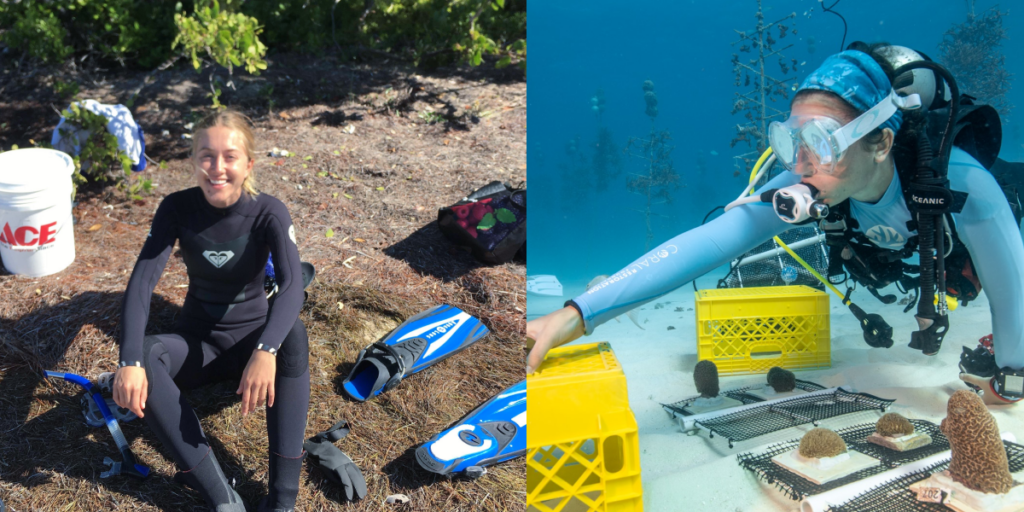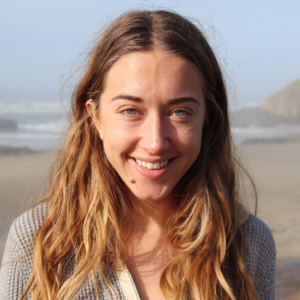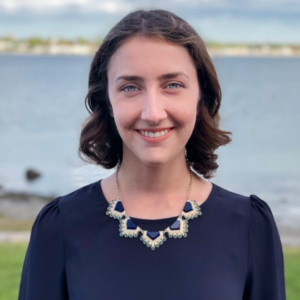 If coral reefs went extinct, much of our marine life would lose their essential ecosystems, millions of people would lose their main source of food, and the global economy would take a huge hit. Coral reefs are among the most ecologically rich and economically robust ecosystems on the planet. They are also among the most threatened—which is why Florida Sea Grant is committed to their protection.
If coral reefs went extinct, much of our marine life would lose their essential ecosystems, millions of people would lose their main source of food, and the global economy would take a huge hit. Coral reefs are among the most ecologically rich and economically robust ecosystems on the planet. They are also among the most threatened—which is why Florida Sea Grant is committed to their protection.
Two new interns have joined Florida Sea Grant’s national coral disease program to support its communications and coordination efforts in response to stony coral tissue loss disease. This September, Florida Sea Grant welcomed Megan Considine, our Water Policy intern; and Krista Laforest, our Coral Health Communications Intern.

Megan Considine holds a M.A. in marine resource management from Oregon State University, where she conducted policy and scientific research on the spread of an invasive pest threatening the oyster aquaculture industry.
Megan Considine grew up in the Chesapeake Bay area where she was inspired to pursue ecological restoration and conservation. She graduated with a master’s degree in marine resource management from Oregon State University, where she conducted policy and scientific research on the spread of an invasive pest threatening the oyster aquaculture industry. There, she also worked closely with colleagues from Oregon Sea Grant. Megan is the co-founder of Urban Reef Lab, a think tank for coral and oyster reef restoration or conservation practices. She has worked on oyster and coral related research with the Virginia Institute of Marine Science and Mote Marine Laboratory and Aquarium. As the new Water Policy Intern, she is excited to contribute to Florida Sea Grant’s work of preventing further transmission of stony coral tissue loss disease.

Krista Laforest holds a B.S. in Marine Biology and a B.A. in Psychology from the University of North Carolina Wilmington. She is pursuing a Master’s degree in Marine Environmental Science at Nova Southeastern University.
Krista Laforest holds a B.S. in Marine Biology and a B.A. in Psychology from the University of North Carolina Wilmington. She is currently pursuing a M.S in Marine Environmental Science at Nova Southeastern University. Krista spent a year working on stony coral tissue loss disease as an intern in the Florida Keys with the Coral Restoration Foundation, during which time she regularly produced an array of communications materials. Most recently, Krista served as 2021 Our World Underwater Scholarship Society American Academy of Underwater Sciences Mitchell Intern researching the impact of herbivorous fishes on reef health and composition in Bonaire. With Florida Sea Grant, Krista will be translating scientific research into easily readable and accessible information for the public.
“The addition of two new fantastic interns to Florida Sea Grant’s national coral disease program will help us better communicate the devastating impacts that this disease has had on our country’s coral reefs and the value of continuing and enhancing research and response efforts,” says Caroline McLaughlin, Florida Sea Grant’s National Coral Disease Coordinator. “They will also contribute to our understanding of how the disease is being transmitted and strategies for stopping the spread of the disease.”
Stony coral tissue loss disease was originally detected in Florida in 2014 and has since spread throughout the Caribbean. While the exact mechanisms of transmission are unknown, it is possible that human activities, like vessel traffic, may play a role in its transmission. With the help of these two new roles, Florida Sea Grant will be working to better understand how various policies may reduce the risk of continued transmission of the disease and how such policies have been used in other instances to address biosecurity concerns with invasive species or pathogens.